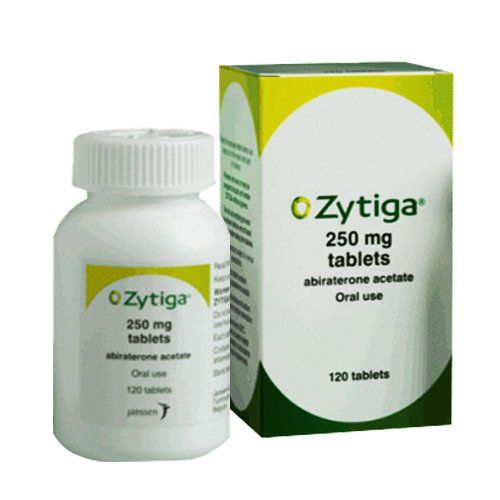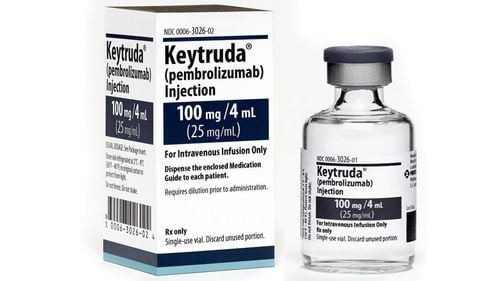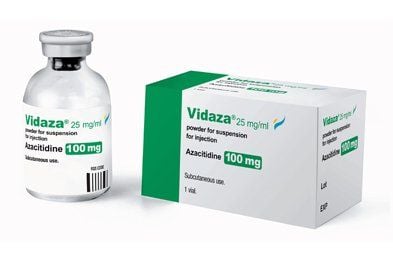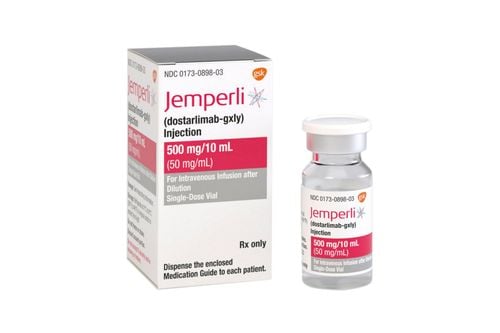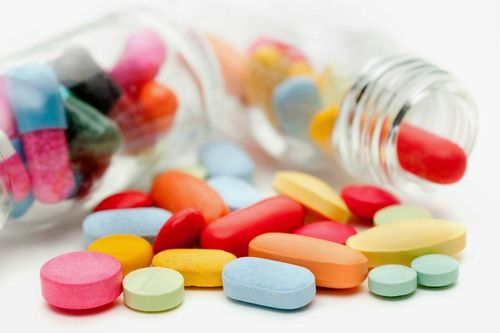This is an automatically translated article.
Cisplatin drug, also known as Platinol drug. This is a compound of platinum consisting of 1 platinum atom joined to 2 chlorine atoms and 2 ammonia molecules in the cis position. Cisplatin has cytotoxic, anti-tumor effects and belongs to the class of alkylating agents.
1. Uses of Cisplatin (Platinol)
Cisplatin or Platinol drugs belong to the group of anti-cancer chemotherapy drugs. Cisplatin forms cross-links within and between DNA strands, thus altering the structure of DNA and inhibiting DNA synthesis.
In addition, to a lesser extent, Cisplatin inhibits protein and RNA synthesis. All of these compounds are important for cell division and growth. By stopping them from dividing, the drug Cisplatin can stop cancer cells from growing.
2. How to use Cisplatin
Cisplatin is given by intravenous infusion (IV, into a vein). The dose and length of treatment is determined by the size and type of your cancer. You will be given intravenous fluids before using Cisplatin.
Even when Cisplatin is used in a medical setting, it can still cause burning and pain. There is a risk that Cisplatin may leak out of the vein at the injection site, leading to potentially serious tissue damage. If the injection area becomes red, swollen, or painful at any time during or after the injection, you should contact your healthcare provider immediately. Do not apply anything to the affected area, unless directed by medical personnel.
Cisplatin may affect the blood levels of some anticonvulsants .
3. Undesirable effects of the drug Cisplatin
There are several things you can do to control the side effects of Cisplatin . Here are some of the most common or important side effects of Cisplatin:
3.1. Kidney problems Cisplatin can cause kidney problems, including increased creatinine levels. An increase in creatinine can be monitored using blood tests. Warning signs of kidney problems include decreased urine output, blood in the urine, swollen ankles, or loss of appetite.
3.2. Peripheral Neuropathy Peripheral neuropathy is a toxic medical condition that affects the nerves. The disease is characterized by numbness or tingling in the hands or feet, which often occurs after wearing socks or gloves. This condition can become increasingly severe with the use of more doses of the drug.
In some people, symptoms will slowly go away after stopping using Cisplatin, but for some, it never goes away completely. You should tell your doctor if you experience numbness or tingling in your hands or feet, as they may need an adjustment in the dose of your medication.
3.3. Severe nausea or vomiting Your doctor may prescribe antiemetics to help control nausea and vomiting. Also, change your diet: avoid things that can worsen symptoms, such as foods that are heavy or greasy/fat, spicy or too acidic like lemons, tomatoes, oranges . Instead, you can use salt water gargle or drink ginger tea to ease the symptoms.
3.4. Hearing problems Cisplatin may cause hearing loss and tinnitus . Your hearing will be tested before you use Cisplatin and as needed during treatment. Tell your doctor if you have tinnitus or if you notice a decrease in your hearing while using Cisplatin.
3.5. Allergic reactions In some cases, you may have signs of an allergic reaction to Cisplatin. Signs of a reaction may include: shortness of breath or difficulty breathing, chest pain, rash, flushing or itching, or a drop in blood pressure. If you notice any changes in how you feel during the infusion, notify your healthcare provider right away. The infusion will be slowed or stopped if you feel uncomfortable. Depending on the severity of the reaction, you may still receive the medicine along with the medicine first to stop the reaction, or if the medicine is given at a slower rate.
3.6. Less common side effects of Cisplatin
Electrolyte abnormalities: Cisplatin can affect the normal levels of electrolytes (potassium, magnesium, calcium, etc.) in your body. Levels of electrolyte abnormalities will be monitored with blood tests. If electrolyte levels become too low, your doctor may prescribe an intravenous or oral infusion. Do not take any supplements without first consulting with your care team. Changes in taste and smell: You may experience a metallic taste or find that food has no taste at all. You may no longer be interested in foods or drinks that you enjoyed before cancer treatment. These signs and symptoms may persist for several months or longer after treatment ends. Vision changes: Cisplatin may cause blurred vision and changes in color perception, especially with higher therapeutic doses or increased frequency of Cisplatin use. Report any changes in vision to your healthcare team right away. Secondary malignancies: There is little risk of developing leukemia or another type of cancer from treatment with Cisplatin, which can occur many years after treatment. This usually involves repeated treatment or the use of high doses of the drug. Possibly reversible encephalopathy syndrome (PRES): In rare cases, Cisplatin has caused a neurological disorder called posterior reversible encephalopathy syndrome (PRES), also known as posterior reversible encephalopathy syndrome (PRES). reversible encephalopathy (RPLS). Symptoms of PRES/RPLS include headache, seizures, coma, confusion, blindness, and other visual and neurological disturbances.
4. Effects of Cisplatin on Reproductive System
Cisplatin can affect the reproductive system leading to menstrual cycles or sperm production becoming irregular or permanently stopping. Women may experience signs of menopause including hot flashes and vaginal dryness. In addition, you may experience a decrease in sex drive during treatment. For men, you can deposit your sperm in a sperm bank if you might want to have children in the future. Exposure to Cisplatin to an unborn baby can cause birth defects, so you should not become pregnant or father a child while taking this medicine. Therefore, women should use effective birth control as necessary during treatment and for at least 14 months after treatment, even if your periods have stopped. For men, you should also use effective birth control as necessary during treatment and for at least 11 months after treatment, even if you believe you are not producing sperm.
Please dial HOTLINE for more information or register for an appointment HERE. Download MyVinmec app to make appointments faster and to manage your bookings easily.
References: oncolink.org




